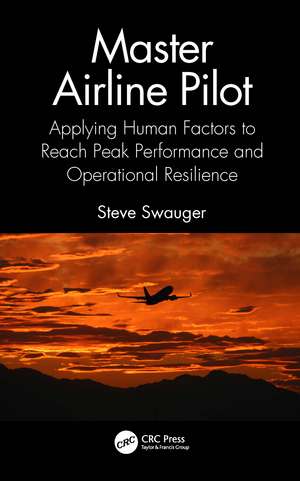Master Airline Pilot: Applying Human Factors to Reach Peak Performance and Operational Resilience
Autor Steve Swaugeren Limba Engleză Paperback – 29 noi 2024
Serving as a practical guide for operational aviation challenges, the book discusses exceptional events such as operations under marginal condition, intervening to interdict an unsafe operation, and resolving crew conflicts. It also provides techniques for handling more common airline flying challenges like delays, holding, diverting, and continuing versus aborting a deteriorating game plan.
The book is intended for airline pilots, training captains, simulator instructors, and aviation students taking courses in flight safety and crew management to improve their skillset, proficiency, and expertise toward peak performance.
| Toate formatele și edițiile | Preț | Express |
|---|---|---|
| Paperback (1) | 383.11 lei 6-8 săpt. | |
| CRC Press – 29 noi 2024 | 383.11 lei 6-8 săpt. | |
| Hardback (1) | 1020.03 lei 6-8 săpt. | |
| CRC Press – 28 apr 2023 | 1020.03 lei 6-8 săpt. |
Preț: 383.11 lei
Preț vechi: 416.43 lei
-8% Nou
Puncte Express: 575
Preț estimativ în valută:
73.31€ • 78.39$ • 61.12£
73.31€ • 78.39$ • 61.12£
Carte tipărită la comandă
Livrare economică 17 aprilie-01 mai
Preluare comenzi: 021 569.72.76
Specificații
ISBN-13: 9781032383453
ISBN-10: 1032383453
Pagini: 604
Ilustrații: 80
Dimensiuni: 156 x 234 mm
Greutate: 1.12 kg
Ediția:1
Editura: CRC Press
Colecția CRC Press
ISBN-10: 1032383453
Pagini: 604
Ilustrații: 80
Dimensiuni: 156 x 234 mm
Greutate: 1.12 kg
Ediția:1
Editura: CRC Press
Colecția CRC Press
Public țintă
Postgraduate, Professional Practice & Development, Professional Training, and Undergraduate AdvancedCuprins
1. The Master Class of Pilots. Section I Introduction to Core Concepts. 2. Risk Management. 3. Complexity. 4. Decision Making. 5. Situational Awareness. 6. Error. 7. Distraction. 8. Safety. 9. Time. Section II Introduction to Techniques. 10. Risk Management Techniques. 11. Decision-Making Techniques. 12. Techniques for Building Situational Awareness. 13. Time Management Techniques. 14. Workload Management Techniques. 15. Distraction Management Techniques. 16. Automation Management Techniques. 17. Communications Techniques. 18. CRM Techniques. 19. PM Role Breakdowns, Callouts, and Interventions. 20. First Officer Roles and Responsibilities. Section III Introduction to Challenging and Non-Normal Operations. 21. Marginal and Deteriorating Conditions. 22. Non-Normal, Abnormal, and Emergency Events. 23. Time-Critical Emergencies. Section IV Introduction to Professionalism. 24. The Master Class Path. 25. The Master Class Skillset. 26. Professional Attributes.
Notă biografică
Steve Swauger is an Aviation Human Factors Consultant with Human Factors Excellence in Aviation, LLC. He holds a BA in Human Factors from the USAF Academy and a MA in National Security Studies from CSU San Bernardino. Over his 40-year pilot career, he flew over 18,000 hours in military and air carrier aircraft. His airline career spanned over 26 years, where he served over 20 years as a Captain on a variety of Boeing 737 aircraft. While flying for the airline, he served for 23 years in a variety of pilots’ union safety committee roles including Safety Committee chair, Human Factors subcommittee lead, GO-Team accident investigator, Professionalism Council lead, and safety investigator.
During his tenure, he authored over 200 articles under his column, "The Human Factor," which were published in union member publications. He has presented and led workshops at the International Symposium of Aviation Psychology and the PACDEFF Human Factors/CRM Conference. He is an original member of the Human Factors Roundtable (a group of Human Factors and Safety department professionals from U.S. Major Airlines and industry). He served on the Active Pilot Monitoring Working Group, which published "A Practical Guide for Improving Flight Path Monitoring" through the Flight Safety Foundation. Additionally, he has served on several workgroups tasked with researching and redesigning airline flightdeck procedures and operating manuals.
During his tenure, he authored over 200 articles under his column, "The Human Factor," which were published in union member publications. He has presented and led workshops at the International Symposium of Aviation Psychology and the PACDEFF Human Factors/CRM Conference. He is an original member of the Human Factors Roundtable (a group of Human Factors and Safety department professionals from U.S. Major Airlines and industry). He served on the Active Pilot Monitoring Working Group, which published "A Practical Guide for Improving Flight Path Monitoring" through the Flight Safety Foundation. Additionally, he has served on several workgroups tasked with researching and redesigning airline flightdeck procedures and operating manuals.
Descriere
Master Airline Pilot offers a process for improving pilots’ skills in risk management, situational awareness building, decision making, communications, and crew management. It links aviation human factors with practical airline operations to promote the development of master-level aviation skills across the full range of pilot experience.
